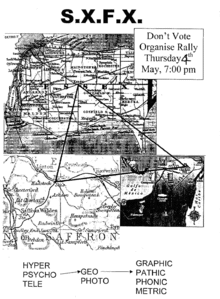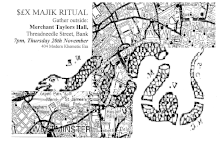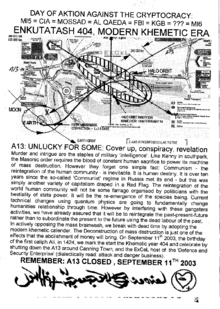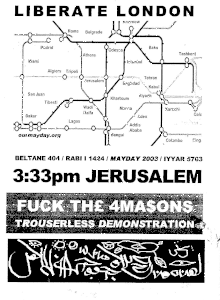Art practices/Psychogeography




Introduction
[edit | edit source]psychogeography The study of the specific effects of the geographical environment (whether consciously organized or not) on the emotions and behavior of individuals.
psychogeographical Relating to psychogeography. That which manifests the geographical environment’s direct emotional effects.
SITUATIONIST INTERNATIONAL 1958
Psychogeography was originally conceived by the Lettrist International - an off shoot of the Lettrist movement. It was later defined by the SI as above. Although psychogeography started out as an art practice in the 1950s, it has since been adopted as means of researching the urban environment in a broader context.[1]
It can be seen as part of art practices but has also been used in the disciplines of geography, media studies, literature and others.
Psychogeographical exercises
[edit | edit source]1. Continuous drift - see dérive
Psychogeographical games
[edit | edit source]1. The Joker - WNLA
Psychogeographical maps
[edit | edit source]Exercise 1:
[edit | edit source]Using a map of one city to navigate another city This was a method used by the Lettrists and Situationists
Exercise 2: Psychogeographs
[edit | edit source]This method was developed by the LPA in some newsletters and maps which combined the cartographies of 2 or more different places in one metagraph or psychogeograph.
London exercise: Using http://antisystemic.org/jpg/psychogeograffyx/tube2002.gif and http://antisystemic.org/jpg/psychogeograffyx/center00.gif
Algorythmic Psychogeography
[edit | edit source]Using algorithms to navigate a drift/ derive. This method was developed in 2001 by Wilfred Hou Jebek in Amsterdam as part of the Hot summer of psychogeography in 2002.
Algoriths used:
In 2016, Karen Karnak issued a call for an international drift game: /UNREAL NON-REALITY
Psychogeographical situations
[edit | edit source]Situations for discussion
[edit | edit source]
These situations made by psychic workers and psychogeographical groups
Can you identify in each video:
- The parameters in space, time and class
- The organiser of the situation?
See also
[edit | edit source]external
[edit | edit source]References
[edit | edit source]- ↑ Richardson T. (2015) Postmodern Urbanism and the New Psychogeography accessed 28 August 2015
